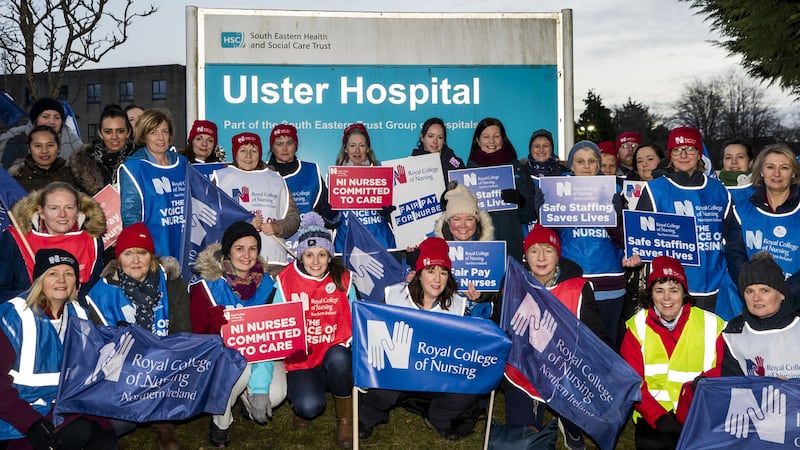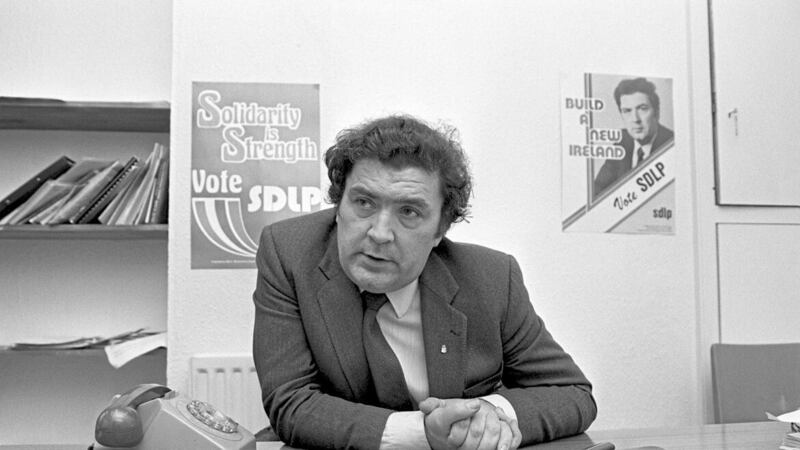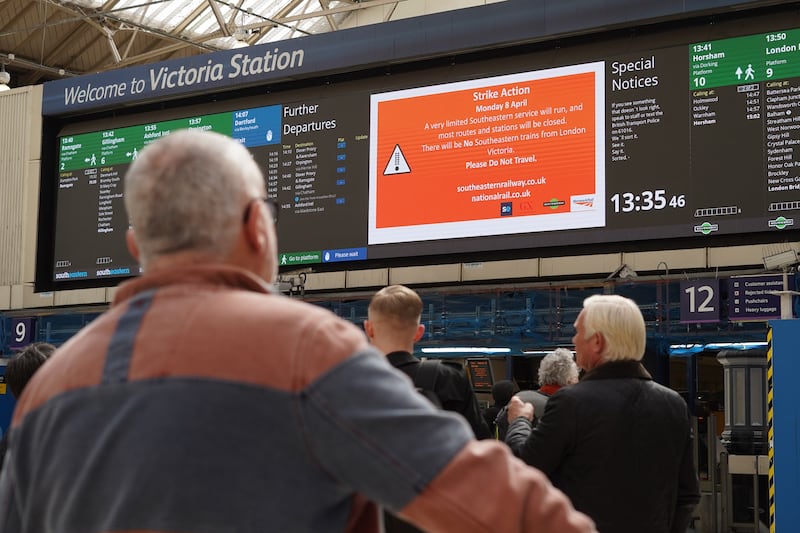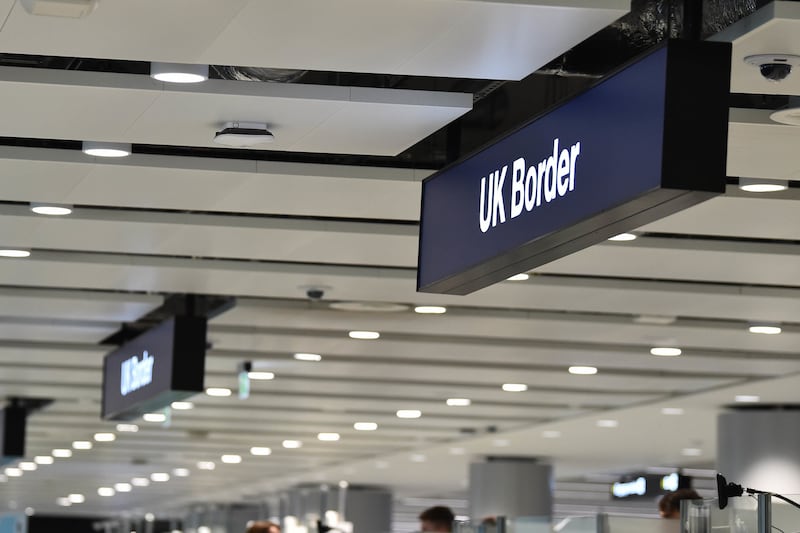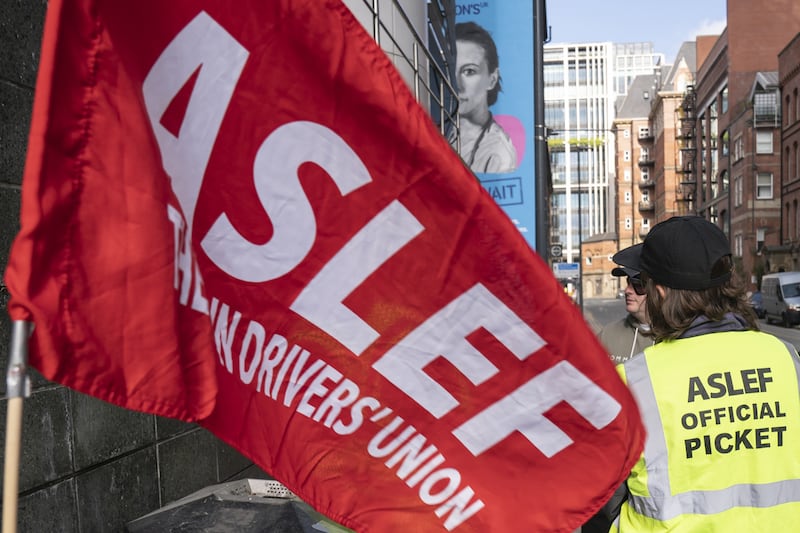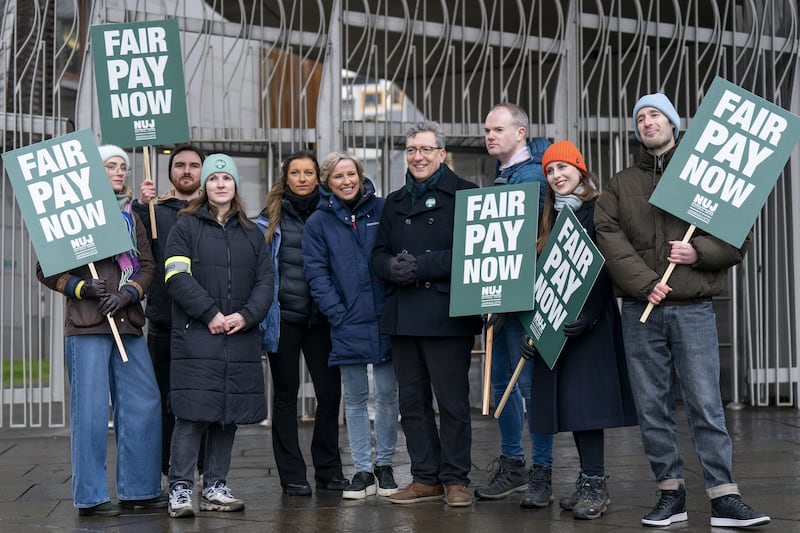Thousands of nurses in Northern Ireland have started another day of strike action in a row over pay.
The protest follows a similar strike last month over salary rates that lag behind colleagues in Britain, and staff shortages.
Thousands of hospital appointments are expected to be cancelled.
The Department of Health has urged trade unions to return to talks. They broke down without agreement in December, when a fresh 3.1% pay offer was rejected by unions.
The Royal College of Nursing (RCN) is leading members away from patient bedsides on Wednesday and Friday, while members of Northern Ireland's largest health workers' union, Unison, will also stage walkouts on Friday.
On the picket line as Nursing Staff strike over unsafe staffing and unfair pay. @irish_news @SeaninGraham22 #belfast #RCNstrike pic.twitter.com/XMgmMsSuZM
— Mal McCann (@MalMccann) January 8, 2020
Midwives are also being asked if they are willing to take strike action over pay.
Unions have called for pay parity with their colleagues in the rest of the UK.
The department's permanent secretary, Richard Pengelly, has warned that hospitals are already under severe pressure.
Speaking at the picket line at the Royal Victoria Hospital, Pat Cullen, director of the Royal College of Nursing in Northern Ireland, said: "I'm out today with our nursing members who are on day two of strike action on behalf of the patients of Northern Ireland and behalf of themselves, asking for pay parity, to be treated the same as every other nurse in the UK, to be paid decently and also to have safe staffing issues addressed for those people in Northern Ireland who deserve an excellent health service, a health service that is able to provide safe and effective care.
"That is what nurses want for their patients and that's what they deserve and nurses are out here on strike today, losing a day's pay once again to ask for those issues to be addressed for patients."
Ms Cullen said the Royal College of Nursing has "written extensively" to the Department of Health.
"We have also engaged with the department in numerous meetings to ask for these issues to be addressed and, to date, what the department says to us is that in the absence of a minister they can't have those issues addressed, they can't deal with them," she said.
"Every table we go to we get the same answer, should it be the Secretary of State's table, local politicians? And in the department of health we are told 'not at my table, those issues can't be addressed'.
"What nurses are saying today on every picket line and those nurses that are continuing to provide life preserving services for patients today in the hospitals but still taking strike action, is there still needs to be a table found where those issues can be addressed for nurses.
"It is absolutely critical that it happens. We have heard from leading experts that the health service is at crisis point. If they can't listen to the voice of front-line staff telling them they need to do something about this, then who is going to listen.
"The nurses are determined, they are resolute, we will continue to keep on doing what they are doing on behalf of patients of Northern Ireland until we get these issues resolved."
Seamus McGoran, interim chief executive of the South Eastern Health and Social Care Trust which includes the Ulster Hospital, Lagan Valley Hospital, Downe Hospital as well as Ards and Bangor community hospitals, said hundreds of planned appointments were cancelled.
Bangor minor injuries department was closed on Wednesday, with nurses instead consolidated at Ards minor injuries unit.
"We have had to take a decision to cancel 712 outpatient appointments and 155 procedures," he told the PA news agency.
"The message I would give to all those people is a huge apology that we have had to cancel their appointment. I absolutely recognise this may be distressing for people who are anxious about their health, but we will do our very best to reappoint those procedures and outpatients slots as soon as we can.
"There is quite a significant impact across our hospital services. There will be further impact with cancellations on Friday, albeit to a lesser extent, 340 outpatients and 89 procedures - but I don't underestimate on an individual personal level what that means for all of those people."
Mr McGoran said there would usually be 1,600 outpatient slots across the trusts' sites on a typical Wednesday.
"We stopped booking slots once we knew of industrial action on January 8 so we would have around 1,600 outpatients slot available to us across our hospitals on any given Wednesday, so the 712 is the people we cancelled," he said.
"We have lost a lot of capacity to see patients and obviously that is hard to catch up on."
Mr McGoran said he is content the trust has "managed things as best we can on a difficult day".
"But we are feeling real pressure now at the Ulster Hospital emergency department as we expected," he said.
However, Mr McGoran said he wanted to make it clear on behalf of the chief executives of all the health trusts in the north that they support their staff and what he termed "their legitimate claim for pay parity with their colleagues in England".
"They are incredible people, they do a fantastic job for our patients and we believe they should be rewarded in the same way as colleagues are in other parts of the UK," he said.
"We obviously recognise the authority is not within the gift of our department of health and we are very clear that we need a political solution to actually deal with this as a matter of urgency.
"We are really, really hoping that our politicians can get their act together and find an agreement to get back into an executive before January 13.
"That's really where we need to see a solution."
Mr McGoran said he believes that a new executive can deliver on pay parity.
"I think when it comes to staffing levels for our services, ourselves, our staff, our trade union colleagues, we're all on the same page with this, we all recognise the huge, ever-increasing demand on our services and all want to build our staffing levels up to the point where we have absolute ability to meet all of the needs of our patients," he said.
"We're having to prioritise our most urgent patients and, for example, those who are waiting for planned care, those numbers are getting bigger and the lengths of waits is getting longer, so we really need political leadership.
"We need long-term investment and we need a workforce plan that will deliver more sustainable staffing levels for many years to come."
Lyndsay Thomson (30) from Bangor, who works at the Ulster Hospital as a staff nurse in anaesthetics, said: "We have got to the point where we are at, or past, breaking point.
"Patient safety is being put at risk every day and nurses have said that enough is enough.
"We have escalated our concerns at every level and we now are at the point where this is what we need to do to make sure that our voice is being heard, that we are getting our point across, that this can not keep going on.
"A plan needs to be put in place, we need more nurses, we need more nursing assistants."
Ms Thomson said nurses in Northern Ireland were angry.
"Nurses are devastated they are having to do this, this is not a day that we thought we would ever reach."
She had hoped the first day of strike action last month would solve the dispute surrounding pay parity and safe staffing levels.
"The fact that we are now on the second day of strikes with a potential third day on Friday is devastating, we are angry but we are angry that nothing is happening.
"The pay disparity is continuing, which then has a knock on effect on patient safety.
"We cannot retain or recruit staff and staff are just at the point of burn out."
Anne Waterman (60) a staff nurse from Belfast involved in day procedures at the Ulster Hospital, said the profession was trying to speak as one voice.
She said their first priority would always be patient safety but Royal College of Nursing (RCN) members were beyond breaking point.
"The stress that staff are under in the wards in all the units in all hospitals in Northern Ireland is beyond being able to be coped with any longer."
She started nursing in 1977 and has seen huge change for the better.
She noted there were more complex cases, patients were living longer and being looked after better and more treatments were being offered.
The ageing population also heaped extra pressure on nursing, Ms Waterman added.
She said the public had been very supportive of the industrial action and nurses appreciated that.
"None of us want to be standing here today, this is not what we are about, we want to be in hospitals doing our job.
"I know people hear us but we really need to be listened to and we don't know what else to do at the minute other than this.
"If I was to stop working for three years I would not be getting paid, I think politicians here really have to step up to the mark, speak up for us and support us because we do not know what else to do."
Ms Waterman said nurses did the same job as their counterparts in the rest of the UK and should enjoy pay parity.
She said so many roles were still to be filled and extra pressure was put on staff who were able to work.
"New members of staff coming in, new nurses, they are looking to more experienced staff to learn from them as well.
"When you are worried about coming into your job, when you are worried about what is going to happen, when you are worried about your registration in case you do something wrong because of the number of people you have to look after and going home feeling the frustration of not being able to do your job properly, and feeling that you are letting people down because you don't feel that you can care for them properly in the way that you would want to, that is not what nursing is about and that is not what we want to be doing."
Northern Ireland has some of the longest waiting lists for treatment in the UK, and the political paralysis at Stormont has hampered efforts to address problems in the NHS.
Numerous appointments and treatments have been cancelled and a number of services across hospitals and the community care sector have had to be stood down or reduced due to industrial action, health service providers said.
All emergency departments will remain open as normal, but they are under extreme pressure due to winter demand.
Reduced staffing levels on Wednesday and Friday will significantly affect the ability of the system to discharge patients and further compound pressures throughout hospital and community services, health and social care organisations said.
The South Tyrone Hospital Minor Injury Unit (MIU), Mid Ulster MIU and Bangor MIU will be closed on Wednesday.
Around 5,000 medical appointments were cancelled following the unprecedented nurses' strike which paralysed parts of the NHS late last year.
Healthcare workers said they were tearful and "at the end of their tether".
Stormont politicians stepped up efforts to restore devolved power-sharing and urged immediate action to address a "humanitarian" crisis in health.
Routine medical appointments were cancelled, minor injury units closed and there were delays to some ambulance responses.
Pickets formed across the north and thousands of nurses walked out in their first ever strike.
